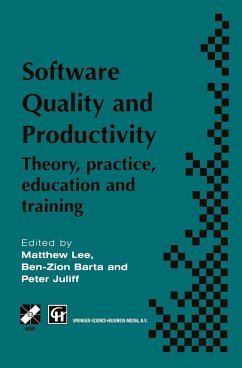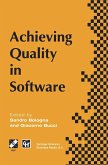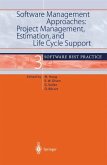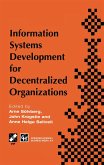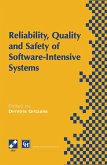M. Lee / Ben-Zion Barta / Peter Juliff (eds.)
Software Quality and Productivity
Theory, Practice, Education and Training
Herausgegeben:Lee, M.; Barta, Ben-Zion; Juliff, Peter
M. Lee / Ben-Zion Barta / Peter Juliff (eds.)
Software Quality and Productivity
Theory, Practice, Education and Training
Herausgegeben:Lee, M.; Barta, Ben-Zion; Juliff, Peter
- Gebundenes Buch
- Merkliste
- Auf die Merkliste
- Bewerten Bewerten
- Teilen
- Produkt teilen
- Produkterinnerung
- Produkterinnerung
As the world becomes increasingly dependent on the use of computers, the need for quality software which can be produced at reasonable cost increases. This IFIP proceedings brings together the work of leading researchers and practitioners who are concerned with the efficient production of quality software.
Andere Kunden interessierten sich auch für
![Achieving Quality in Software Achieving Quality in Software]() S. Bologna / G. Bucci (eds.)Achieving Quality in Software252,99 €
S. Bologna / G. Bucci (eds.)Achieving Quality in Software252,99 €![The China Information Technology Handbook The China Information Technology Handbook]() Patricia Ordóñez de Pablos / Miltiadis D. Lytras (eds.)The China Information Technology Handbook147,99 €
Patricia Ordóñez de Pablos / Miltiadis D. Lytras (eds.)The China Information Technology Handbook147,99 €![Software Management Approaches: Project Management, Estimation, and Life Cycle Support Software Management Approaches: Project Management, Estimation, and Life Cycle Support]() Michael Haug / Eric W. Olsen / Gilles Vallet / Olivier Becart (eds.)Software Management Approaches: Project Management, Estimation, and Life Cycle Support41,99 €
Michael Haug / Eric W. Olsen / Gilles Vallet / Olivier Becart (eds.)Software Management Approaches: Project Management, Estimation, and Life Cycle Support41,99 €![Design Research in Information Systems Design Research in Information Systems]() Alan HevnerDesign Research in Information Systems95,99 €
Alan HevnerDesign Research in Information Systems95,99 €![Guide to Advanced Empirical Software Engineering Guide to Advanced Empirical Software Engineering]() Forrest Shull / Janice Singer / Dag I.K. Sjøberg (eds.)Guide to Advanced Empirical Software Engineering203,99 €
Forrest Shull / Janice Singer / Dag I.K. Sjøberg (eds.)Guide to Advanced Empirical Software Engineering203,99 €![Information Systems Development for Decentralized Organizations Information Systems Development for Decentralized Organizations]() Arne SoelvbergInformation Systems Development for Decentralized Organizations246,99 €
Arne SoelvbergInformation Systems Development for Decentralized Organizations246,99 €![Reliability, Quality and Safety of Software-Intensive Systems Reliability, Quality and Safety of Software-Intensive Systems]() Dimitris GritzalisReliability, Quality and Safety of Software-Intensive Systems110,99 €
Dimitris GritzalisReliability, Quality and Safety of Software-Intensive Systems110,99 €-
-
-
As the world becomes increasingly dependent on the use of computers, the need for quality software which can be produced at reasonable cost increases. This IFIP proceedings brings together the work of leading researchers and practitioners who are concerned with the efficient production of quality software.
Hinweis: Dieser Artikel kann nur an eine deutsche Lieferadresse ausgeliefert werden.
Hinweis: Dieser Artikel kann nur an eine deutsche Lieferadresse ausgeliefert werden.
Produktdetails
- Produktdetails
- IFIP Advances in Information and Communication Technology
- Verlag: Springer / Springer US / Springer, Berlin
- Artikelnr. des Verlages: 978-0-412-62960-0
- 1994.
- Seitenzahl: 404
- Erscheinungstermin: 31. Dezember 1994
- Englisch
- Abmessung: 234mm x 156mm x 24mm
- Gewicht: 1680g
- ISBN-13: 9780412629600
- ISBN-10: 0412629607
- Artikelnr.: 24504388
- Herstellerkennzeichnung
- Produktsicherheitsverantwortliche/r
- Europaallee 1
- 36244 Bad Hersfeld
- gpsr@libri.de
- IFIP Advances in Information and Communication Technology
- Verlag: Springer / Springer US / Springer, Berlin
- Artikelnr. des Verlages: 978-0-412-62960-0
- 1994.
- Seitenzahl: 404
- Erscheinungstermin: 31. Dezember 1994
- Englisch
- Abmessung: 234mm x 156mm x 24mm
- Gewicht: 1680g
- ISBN-13: 9780412629600
- ISBN-10: 0412629607
- Artikelnr.: 24504388
- Herstellerkennzeichnung
- Produktsicherheitsverantwortliche/r
- Europaallee 1
- 36244 Bad Hersfeld
- gpsr@libri.de
Ben-Zion Barta is with Bar-Code Computers Ltd., Israel Peter Juliff is Head of the School of Management and Information Systems, Deakin University, Burwood, Australia
One Keynote papers.- 1 Towards the 21st Century's software quality, state-of-the-art and international standard in JTC1/SC7.- 2 Software quality and productivity improvement.- Two Requirements, Design and Development Methodologies.- 3 Progress towards RACE: a 'soft-centred' requirements definition method.- 4 MOOSE: A method designed for ease of maintenance.- 5 BPR for developing information systems - a case study.- 6 Towards a methodology for 24 hour software production using globally separated development teams.- 7 MetaMet - a soft systemic way toward the quality of information systems.- 8 Changing programming paradigm - an empirical investigation.- 9 Application-oriented methods for systems development - a review.- 10 A proposal for composing software design process.- 11 Team-based software development using an electronic meeting system: the quality pay-off.- 12 Designing with non-functional requirements.- 13 Modelling the requirements of process controlled systems.- 14 Compiling heterarchical programs by means of Petri nets.- Three Object Oriented Analysis, Design and Development.- 15 Type checking classes in Object-Z to promote quality of specifications.- 16 An axiom-based test case selection strategy for object-oriented programs.- 17 AMI: a case tool based on artificial intelligence techniques for an interactive modelling for analysis.- 18 Object-oriented framework for requirement specification.- 19 A structured object-oriented view on systems modeling.- 20 Construction of a WYSIWYG LaTeX typesetting system using object-oriented design.- 21 A re-engineering approach for object-oriented database design.- Four Software Process and Capability.- 22 Software process model specification.- 23 Soft systems methodology - a process view.- 24 BOOTSTRAP -improving the capability of software industry with database support.- Five Project Management.- 25 On the optimal timing of software development cycle.- 26 Information systems project manager's critical success factors: in-house verses outsourced development.- 27 Measuring the value and performance of your IT department.- Six Quality, Reliability, Standards.- 28 ISO standards in software engineering.- 29 An investigation of desired quality attributes for different types of software.- 30 A unifying model for software quality engineering.- 31 Quality achievement: current practices and the way ahead.- 32 Software reliability models for practical applications.- 33 Assessing the quality of requirements engineering products.- 34 Re-certification of software reliability without re-testing.- 35 SAFE: a programming language for software quality.- 36 Impact of organisational maturity on software quality.- 37 Using strongest postconditions to improve software quality.- Seven Specifications, Metrics, Assessment.- 38 Experience in software inspection techniques.- 39 Measuring process improvement: integrating software process assessment with quality cost evaluation.- 40 Mutation versus all-uses: an empirical evaluation of cost, strength and effectiveness.- 41 Software quality: the user's point of view.- 42 Complexity measures for system development models.- 43 Composite complexity measures (CCM).- 44 Automated testing tool for NATURAL®.- 45 Analysis of data collected from software development case studies.- 46 A framework for software development technical reviews.- 47 A model-based approach for software test process improvement.- 48 Size estimation for C programs with different applications.- 49 Cyclomatic complexity as a measure of the structure of knowledge-based/expertsystems.- 50 S/C: a software size/complexity measure.- 51 A critical re-examination of cyclomatic complexity measures.- 52 Reliability through cooperative work in software testing.- Eight Reusability.- 53 Code reusability mechanisms.- 54 Rule-based reasoning approach for reusable design component retrieval.- 55 A multi-layer metrics combination model for reusable software components.- Nine Integrated Environments, Case Tools.- 56 Environment for three dimensional graphics user interface development.- 57 PEACE: process evolution and adaptation CASE environment - its framework and requirements.- 58 Software development environments to support model consistency.- Ten Education and Training.- 59 Process oriented instruction for software engineers (POISE): perspectives and experiences.- 60 OO methods in teaching: current experience and future possibilities.- Index of contributors.- Keyword index.
One Keynote papers.- 1 Towards the 21st Century's software quality, state-of-the-art and international standard in JTC1/SC7.- 2 Software quality and productivity improvement.- Two Requirements, Design and Development Methodologies.- 3 Progress towards RACE: a 'soft-centred' requirements definition method.- 4 MOOSE: A method designed for ease of maintenance.- 5 BPR for developing information systems - a case study.- 6 Towards a methodology for 24 hour software production using globally separated development teams.- 7 MetaMet - a soft systemic way toward the quality of information systems.- 8 Changing programming paradigm - an empirical investigation.- 9 Application-oriented methods for systems development - a review.- 10 A proposal for composing software design process.- 11 Team-based software development using an electronic meeting system: the quality pay-off.- 12 Designing with non-functional requirements.- 13 Modelling the requirements of process controlled systems.- 14 Compiling heterarchical programs by means of Petri nets.- Three Object Oriented Analysis, Design and Development.- 15 Type checking classes in Object-Z to promote quality of specifications.- 16 An axiom-based test case selection strategy for object-oriented programs.- 17 AMI: a case tool based on artificial intelligence techniques for an interactive modelling for analysis.- 18 Object-oriented framework for requirement specification.- 19 A structured object-oriented view on systems modeling.- 20 Construction of a WYSIWYG LaTeX typesetting system using object-oriented design.- 21 A re-engineering approach for object-oriented database design.- Four Software Process and Capability.- 22 Software process model specification.- 23 Soft systems methodology - a process view.- 24 BOOTSTRAP -improving the capability of software industry with database support.- Five Project Management.- 25 On the optimal timing of software development cycle.- 26 Information systems project manager's critical success factors: in-house verses outsourced development.- 27 Measuring the value and performance of your IT department.- Six Quality, Reliability, Standards.- 28 ISO standards in software engineering.- 29 An investigation of desired quality attributes for different types of software.- 30 A unifying model for software quality engineering.- 31 Quality achievement: current practices and the way ahead.- 32 Software reliability models for practical applications.- 33 Assessing the quality of requirements engineering products.- 34 Re-certification of software reliability without re-testing.- 35 SAFE: a programming language for software quality.- 36 Impact of organisational maturity on software quality.- 37 Using strongest postconditions to improve software quality.- Seven Specifications, Metrics, Assessment.- 38 Experience in software inspection techniques.- 39 Measuring process improvement: integrating software process assessment with quality cost evaluation.- 40 Mutation versus all-uses: an empirical evaluation of cost, strength and effectiveness.- 41 Software quality: the user's point of view.- 42 Complexity measures for system development models.- 43 Composite complexity measures (CCM).- 44 Automated testing tool for NATURAL®.- 45 Analysis of data collected from software development case studies.- 46 A framework for software development technical reviews.- 47 A model-based approach for software test process improvement.- 48 Size estimation for C programs with different applications.- 49 Cyclomatic complexity as a measure of the structure of knowledge-based/expertsystems.- 50 S/C: a software size/complexity measure.- 51 A critical re-examination of cyclomatic complexity measures.- 52 Reliability through cooperative work in software testing.- Eight Reusability.- 53 Code reusability mechanisms.- 54 Rule-based reasoning approach for reusable design component retrieval.- 55 A multi-layer metrics combination model for reusable software components.- Nine Integrated Environments, Case Tools.- 56 Environment for three dimensional graphics user interface development.- 57 PEACE: process evolution and adaptation CASE environment - its framework and requirements.- 58 Software development environments to support model consistency.- Ten Education and Training.- 59 Process oriented instruction for software engineers (POISE): perspectives and experiences.- 60 OO methods in teaching: current experience and future possibilities.- Index of contributors.- Keyword index.

